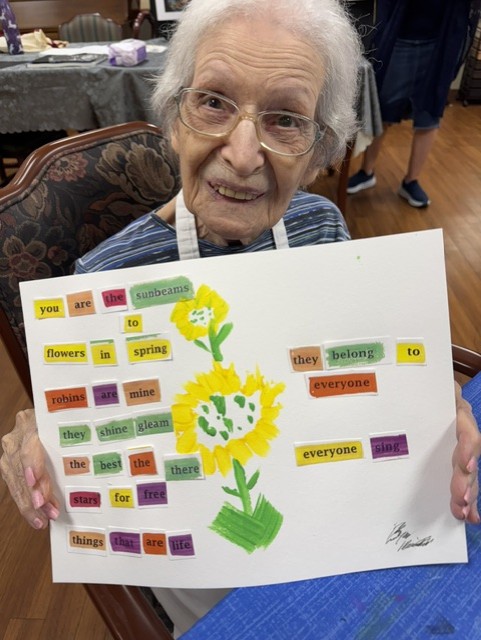When our son was about 3 1/2 years old and our daughter 8 months, Dave was preparing dinner in the kitchen. He had placed Hannah in the swing chair that she loved. That wind-up apparatus kept her happy when the chair was in motion. As he was working to get dinner ready and on a time crunch, when the chair’s mechanism stopped. Dave was not able to take the couple of steps into the dining room to wind it back up. Hannah was unhappy and communicated this through her tears and crying.
Big brother, Andrew, came to the rescue. He couldn’t reach the winding handle but had learned that if you gently pushed the chair it would swing with a decreasing rhythm for a few moments. When he did this, his sister stopped crying. But that movement did not continue for very long and she soon shared her discontent when the swing stopped. Two more times, Dave observed the big brother stepping up to help his sister with the gentle push disrupting the noise and restoring peace only to have it erupt again. After the fourth try to bring about peace and happiness, he gave up and shared his first piece of brotherly advice: “Sometimes, Hannah, life just isn’t fair.”
We had no idea when or where he had heard those words or grasped the concept that things don’t always go as we would like. He certainly had many occasions in his young life when he didn’t get his own way. But I don’t think we had ever said those words to him….or perhaps we had.
Fairness in Our Daily Transactions
There is an element of “fairness” that exists in our transactions. As in, when one person divides the last piece of dessert, and the other person gets to choose the piece first. In most cultures, that would indicate that the person dividing the dessert will try to do so as evenly as possible. And both will receive the same amount or their fair share.
There is also an element of “fairness” that comes from the belief that good actions should result in positive results. But we all know that good people experience the fullness of life, including sickness and tragedy and desserts that are less than what they thought they deserved.
We have all experienced the feeling that life treats us unfairly. Disappointment, anger, disbelief, the feeling of helplessness or that feeling that life is beyond our control are some potential emotional responses. And that is it: our response is what we do have the power to control.
We can’t control the decisions of others. We can’t control the systemic structures that are in place that result in unfair treatment. We can’t control the encounters that create pain and disruption to the order of the universe even when we think we are at the center and in control. But we can work to consider other perspectives which in turn allows us to change our response.
The Parable of the Vineyard Laborers
In the parable of the vineyard laborers that is shared in the Gospel of Matthew (20:1-16), we have a story about what some see as unfairness. The short summary is that the owner of the vineyard pays everyone a day’s wage regardless of when they were hired to come work in the vineyard that day. At the end of the day, those who began work at 9:00 complained because those who started at noon and at 3:00 and at 5:00 were all paid the same amount as they, who started at the beginning of the day, were paid. The owner asks those who worked the full day if they are jealous because of his generosity.
The last line in this parable is an often-repeated line: “The last will be first and the first will be last”. It is most often repeated in jest following board games by the one who lost the game. Or when someone comes to the dinner table last as they attempt to claim “firstness”.
But this parable is about the awareness that life is not fair. We can all name situations of which we are aware where things do not seem equal between individuals or groups. There are systems that have been built into life that do not treat everyone with a “fair” or equal amount of respect or access to resources.
So How, Then, Do We Respond?
Some suggest that this parable is about God’s vision of what it means to live in community, in God’s kin-dom. It shifts the question from one of fairness based on equality to a community that is rooted in all having enough. It challenges us to consider what we expect from the relational transactions that we engage in every day. This then opens the possibility of our assessing our own responses.
It is not a question of whether life is fair—the more life experience we have, the more we know that fairness is not always the most pressing issue. The question is how do we process our response to those situations? How do we shift our perspective to decide when and how to respond to unfairness and when to walk away?
There are times when it is just not possible to keep giving gentle pushes to the swing to comfort someone else when we can’t reach the handle to wind up the mechanism that would make everyone happy. And there are times when we need to allow others the space to learn how to respond in their own lives.
But thank goodness we do have the ability to learn throughout our lives. Imagine a world in which people don’t learn these things and we all continue to scream and cry every time we don’t get what we want. Sometimes we just need to take a little brotherly advice and remember that life isn’t always fair.
For Reflection (either individually or with a group)
Read the blog. Read it a second time, maybe reading it aloud or asking someone else to read it aloud so you can hear it with different intonation and emphases. Then spend some time with the following questions. Take the questions for a walk in the woods or in your neighborhood, for a swim or a run or for a hot soak in the tub. Invite the questions to join you for tea or coffee.
- When did you first learn that life is not fair?
- What is your immediate reaction to a situation that seems unfair?
- How would you like to respond in those situations?
Download a pdf including the Reflection Questions to share and discuss with friends, family, or members of your faith community small group.
10/12/23 14:00
View all articles by:






















